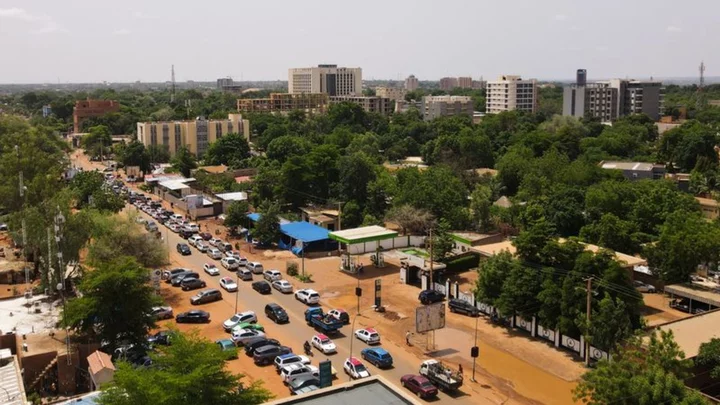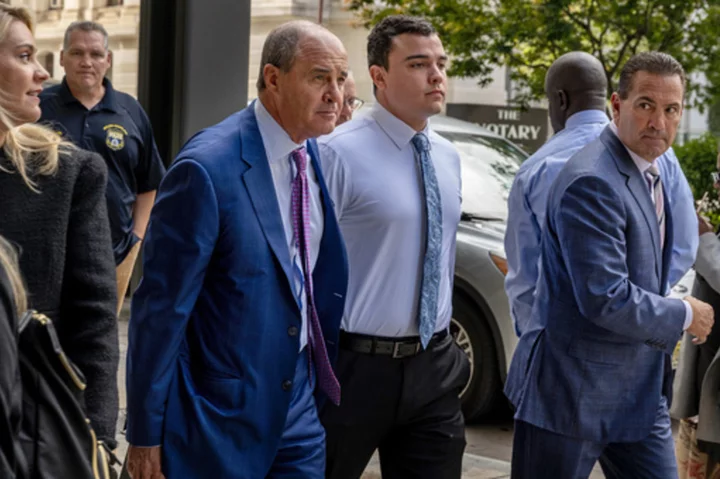By Boureima Balima and Abdel-Kader Mazou
NIAMEY/ABUJA (Reuters) -Hundreds of supporters of Niger's junta marched in the capital Niamey on Thursday to protest against West African sanctions, as regional defence chiefs discussed possible intervention to restore democracy.
General Abdourahamane Tiani, the former head of Niger's presidential guard, confined President Mohamed Bazoum to his residence last Wednesday and declared himself head of state in the seventh coup in West and Central Africa since 2020.
The main regional bloc, the Economic Community of West African States (ECOWAS), has imposed sanctions and said it could authorise the use of force if soldiers did not restore Bazoum to power by Sunday.
ECOWAS, which said that coups would no longer be tolerated in the region following recent military takeovers in Mali, Burkina Faso and Guinea, has taken its hardest line yet with Niger, saying it has to show that it "cannot only bark but can bite".
Tiani, who has won the backing of the juntas in Mali and Burkina Faso, has said his country would fight back.
"If they (ECOWAS) pursue their destructive logic to the end, may Allah watch over Niger and ensure that this is the final great battle we will fight together for a true independence of our nation," he said in a televised speech on Wednesday evening.
Thursday marks the 63rd anniversary of Niger's independence from France.
One of the demonstrators in Niamey held a placard that said: "Long live Niger, Russia, Mali and Burkina. Down with France, ECOWAS, EU."
Like the coups in Burkina Faso and Mali, Niger's military takeover came amid a growing wave of anti-French sentiment, with locals saying they want the former colonial ruler to stop interfering in their affairs.
France has between 1,000 and 1,500 troops in Niger, helping to fight an insurgency by groups linked to al Qaeda and Islamic State that has spread across the region. Burkina Faso and Mali have already kicked out French troops, many of whom are now stationed in Niger.
Western countries are concerned that Niger could emulate those neighbours in turning towards Russia as an ally and that the unrest could allow Islamists to gain ground.
"We are going to do a demonstration to all the countries of ECOWAS and all who are taking inhumane and unpopular measures toward Niger," another protester, who did not give his name, told Reuters.
In his address on Wednesday, Tiani called the sanctions "inhumane", saying he rejected any foreign interference but was open to dialogue within the country.
INTERVENTION PLAN
West African defence chiefs meeting in Nigeria were due to conclude their discussions about possible intervention in Niger, although they have said this would be a last resort.
Senegalese Foreign Minister Aissata Tall Sall said soldiers from Senegal would participate if ECOWAS decided to intervene.
ECOWAS also said on Wednesday that it had sent a Nigerian-led delegation to Niger to negotiate with the coup leaders. However, a source in Nigeria's presidency said the delegation had not yet left due to an issue relating to flight permits.
Mali and Burkina Faso have said they will treat an intervention in Niger as a "declaration of war" against them too, and would withdraw from ECOWAS and come to Niamey's defence.
Tiani sent a general to both countries on Wednesday to shore up support.
China said on Thursday it believed Niger and regional countries had the wisdom and capability to find a political solution.
There were signs that regional sanctions are starting to have an impact: Nigeria cut power supplies to Niger, while Nigerien truckers were stranded in limbo by border closures.
The turmoil has prompted some European nations to evacuatecitizens by plane. Paris said on Thursday it has completed the evacuation of hundreds of French and European citizens.
Niger is the world's seventh-biggest producer of uranium, widely used for nuclear energy and treating cancer. The EU has said so far it is not worried about supply cuts.
(Additional reporting by Camillus Eboh, Thiam Ndiaga, Tiemoko Diallo and Ange Aboa; writing by Alessandra Prentice and Nellie Peyton; editing by Alexander Winning, Emelia Sithole-Matarise, Nick Macfie and Giles Elgood)









